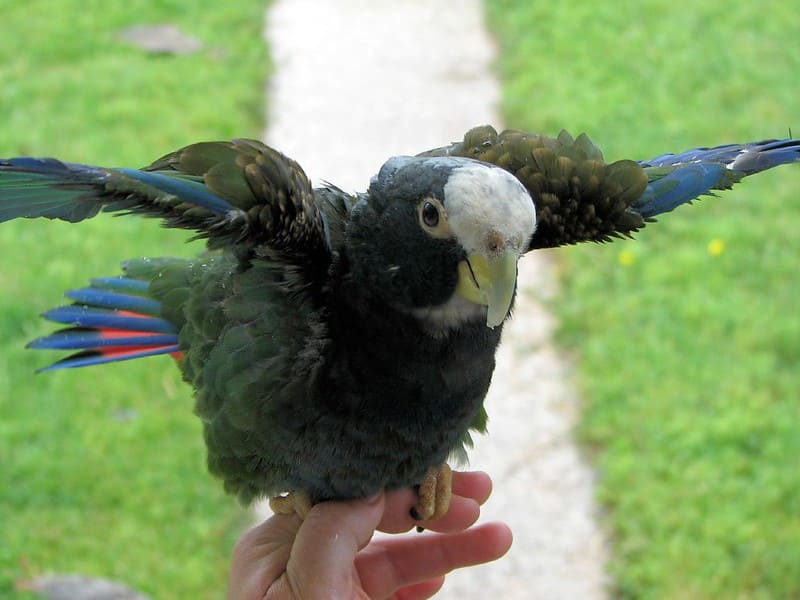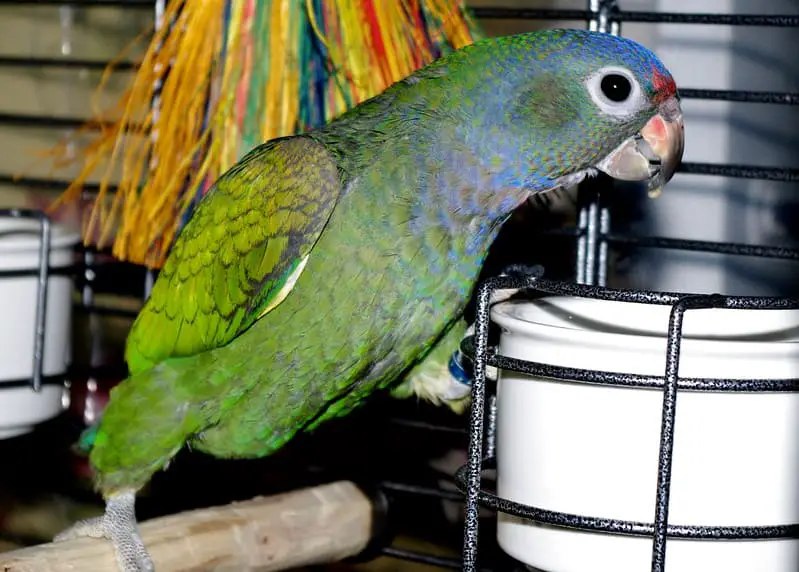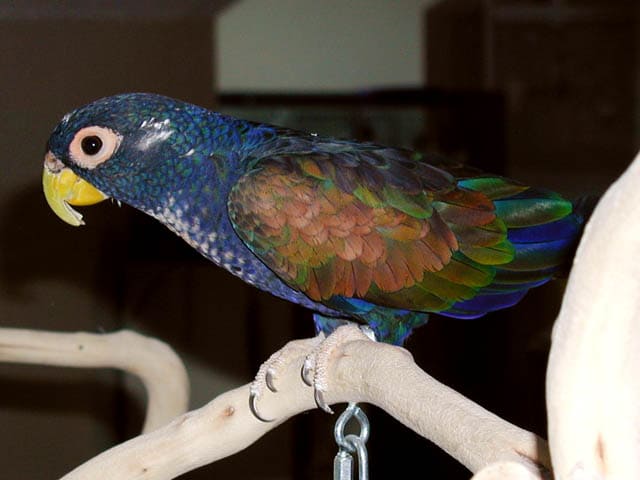Pionus parrots, often referred to as “Pionids” or “Pionus,” are a group of medium-sized parrots known for their gentle and quiet disposition, vibrant plumage, and charming personalities. With several species within the Pionus genus, these birds have their unique traits, and they make excellent companions for many bird enthusiasts. However, like any pet, Pionus parrots come with their own set of pros and cons. In this comprehensive guide, we will explore the advantages and disadvantages of having a Pionus parrot as a pet, helping you make an informed decision about whether this feathered friend is the right fit for your lifestyle and preferences.

Pionus Parrot Species
Before diving into the pros and cons, it’s essential to understand that there are several species within the Pionus genus. Each species has its characteristics and variations in behavior and appearance. Some of the most well-known Pionus parrot species include:
- Blue-headed Pionus (Pionus menstruus): Recognized for its striking blue head and distinctive red vent.
- Bronze-winged Pionus (Pionus chalcopterus): Known for its beautiful bronze wings and engaging personality.
- White-capped Pionus (Pionus senilis): Named for its white crown and engaging social nature.
- Dusky Pionus (Pionus fuscus): Recognized for its dusky plumage and loving demeanor.
- Maximilian’s Pionus (Pionus maximiliani): Renowned for its vibrant green feathers and affectionate disposition.
Each Pionus species has its unique colors and characteristics, but they share common traits that make them suitable as pets for many bird lovers.
Pros of Having a Pionus Parrot
Pionus parrots offer several advantages as pets, making them an appealing choice for individuals and families. Here are some of the notable pros:
1. Quiet and Gentle Nature
Pionus parrots are known for their calm and quiet demeanor. Unlike some other parrot species that can be noisy and demanding, Pionus parrots tend to be more mellow. They are less likely to produce ear-piercing screams, making them suitable for apartment living or homes where a quieter pet is desired.
2. Affectionate and Social
Pionus parrots are naturally affectionate birds that enjoy interaction with their human caregivers. They often form strong bonds with their owners and are known to be quite cuddly. This social nature makes them pleasant companions, as they appreciate spending time with their human family members.
3. Low Maintenance
Compared to some other parrot species, Pionus parrots are relatively low-maintenance pets. They do not require as much attention or mental stimulation as some of the more high-energy parrots. While interaction and socialization are essential, Pionus parrots are content with less demanding playtime.
4. Beautiful Plumage
Pionus parrots are prized for their vibrant plumage, featuring a mix of striking colors, including blues, greens, and reds. Their eye-catching appearance can be a significant attraction for bird enthusiasts and adds to their charm as pets.
5. Playful and Curious
Pionus parrots have a playful and curious nature, which can lead to delightful interactions with their owners. They often enjoy exploring their environment and interacting with toys, providing both mental stimulation and entertainment.
6. Long Lifespan
Pionus parrots have a relatively long lifespan compared to some other pet birds. With proper care, they can live for several decades, providing the potential for a long and enduring companionship.
7. Natural Maturity
Pionus parrots tend to reach sexual maturity at a later age than some other parrot species. This can result in a more predictable and consistent temperament, as they are less likely to experience the hormonal changes that lead to behavioral challenges in younger parrots.

Cons of Having a Pionus Parrot
While Pionus parrots offer many advantages as pets, there are also some downsides to consider. It’s crucial to be aware of these potential challenges before bringing one into your home. Here are some of the cons:
1. Allergenic Potential
Some individuals may be allergic to bird dander or feathers. Pionus parrots, like other pet birds, can produce allergens that affect sensitive individuals. It’s important to consider potential allergies when bringing a Pionus parrot into your home.
2. Dust and Mess
Pionus parrots, like most birds, produce dust from their feathers, which can settle on surfaces in your home. Additionally, they can be messy eaters, scattering food and droppings around their cage. Regular cleaning is necessary to maintain a clean living environment.
3. Potential Health Issues
Pionus parrots can be prone to certain health issues, such as respiratory problems, fungal infections, and feather plucking. Regular veterinary check-ups and a well-maintained living environment are essential to prevent and address these health concerns.
4. Requires Social Interaction
While Pionus parrots are social and affectionate, they do require regular social interaction with their owners. If left alone for extended periods without companionship and mental stimulation, they can become bored or stressed.
5. Noise Level
While Pionus parrots are generally quieter than some other parrot species, they are not entirely silent. They can still produce vocalizations, which may include soft whistles, chirps, and occasional squawks. It’s important to be prepared for some level of noise.
6. Lifespan Considerations
While the long lifespan of Pionus parrots can be an advantage, it’s also important to consider the commitment involved. Potential owners should be prepared for a lifelong commitment to their pet, which may extend for several decades.
7. Limited Availability
Pionus parrots are less common in the pet trade compared to some other parrot species. This limited availability can make it more challenging to find a Pionus parrot for adoption or purchase.

Special Considerations for Pionus Parrot Care
To provide the best possible care for a Pionus parrot, there are some special considerations to keep in mind:
- Diet: Offer a well-balanced diet that includes a variety of fresh fruits, vegetables, high-quality parrot pellets, and occasional treats. Avoid feeding them avocado, chocolate, caffeine, and high-fat or sugary foods.
- Socialization: Spend time interacting with your Pionus parrot daily to provide social and mental stimulation. They enjoy cuddling, talking, and playing with their owners.
- Cage and Environment: Provide a spacious and secure cage with appropriate perches and toys for mental enrichment. Pionus parrots enjoy climbing and exploring, so provide a variety of activities within their cage.
- Grooming: Pionus parrots may benefit from regular grooming, such as nail trimming and beak maintenance. Consult with an avian veterinarian for guidance on grooming.
- Veterinary Care: Schedule regular check-ups with an avian veterinarian to monitor your parrot’s health and address any potential issues promptly.
- Hormone Management: Be aware of hormonal changes that can affect behavior. Seek guidance from an avian veterinarian on managing and addressing hormonal behavior.
- Noise Management: While Pionus parrots are quieter than some species, it’s still important to manage noise levels, especially in shared living spaces. Offer toys and activities to keep them engaged and reduce vocalizations.
Conclusion
Pionus parrots are a delightful and charming addition to the world of pet birds. Their gentle nature, affectionate disposition, and beautiful plumage make them appealing companions for bird enthusiasts. While they come with a few challenges, the advantages of having a Pionus parrot as a pet, such as their low-maintenance nature and quiet temperament, often outweigh the disadvantages.
If you are considering bringing a Pionus parrot into your home, it’s essential to understand their specific needs and commit to providing them with a loving and nurturing environment. With proper care, a Pionus parrot can become a cherished member of your family, offering years of companionship and affection.
